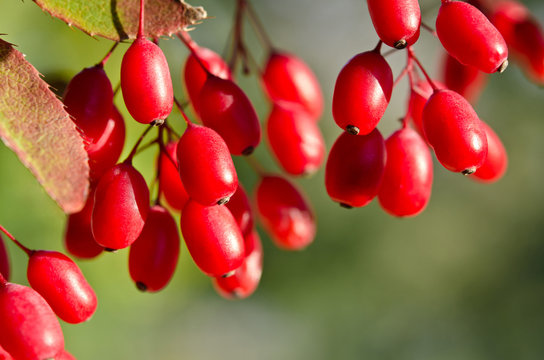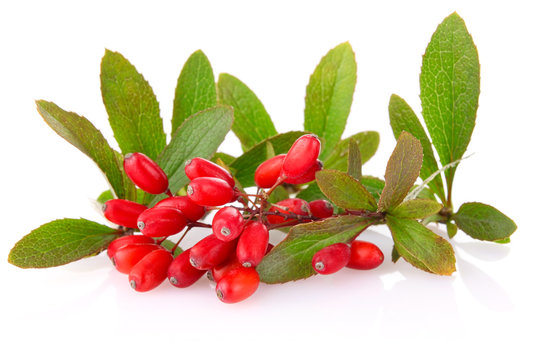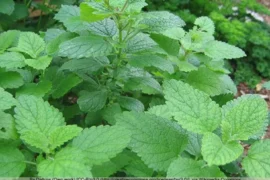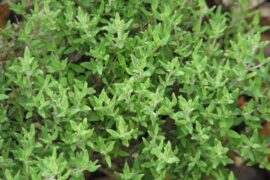Table of Contents
ToggleOverview
What is Barberry?
Barberry (Berberis vulgaris) is known for its small, bright red berries and yellow roots. Native to Europe, Asia, and North America, it has been used for thousands of years in herbal medicine, particularly in Europe, Asia, and the Middle East. Every part of the plant- bark, berries, and roots- provides impressive health benefits. The medicinal properties of the herb are attributed to its alkaloids, flavonoids, and organic compounds. Berberine is the most studied alkaloid present in barberry. Other natural sources of berberine include goldenseal, Chinese goldthread, yellowroot, and Oregon grape.
The berries themselves are not only striking in color but also boast a tangy, sour taste due to berberine content. While they might be too sour to eat raw in large quantities, they have been traditionally used in cooking, teas, and as herbal supplements due to their health-promoting properties.

Health Benefits of Barberry
- Boosts Digestive Health: One of the most recognized benefits of barberry is its positive impact on the digestive system. Barberry has natural antimicrobial properties that can build a healthy gut microbiome. The alkaloid berberine has been demonstrated to improve digestion, stimulate bile production, and enhance the absorption of nutrients. It is often used in treating digestive discomforts, such as indigestion, constipation, and bloating. Studies in rats shows that berberine can help prevent gut inflammation.
- Supports Liver Health: The liver is a major organ in the body. Toxins and fat can build up over time causing fatty liver disease. Barberry has been traditionally used to support liver function. Research suggests that berberine can help protect the liver from damage caused by toxins and oxidative stress. It may also aid in detoxifying the liver, promoting overall liver health and improving metabolic functions.
- Heart Health: Studies have shown that berberine can have a positive effect on heart health by lowering cholesterol levels, reducing triglycerides, and improving blood circulation. Research on the antihypertensive properties of barberry shows that it can lower blood pressure, increase heart contraction, and protect from reperfusion injury. Its ability to regulate blood sugar levels can also lower the risk of heart disease, particularly in people with diabetes or metabolic syndrome.
- Anti-Inflammatory Effects: The anti-inflammatory properties of barberry are primarily attributed to berberine, berbamine, and palmatine. Investigative studies on mice reveal that these alkaloids exhibit anti-inflammatory abilities. Persistent inflammation is linked to a variety of health issues, including autoimmune disorders, arthritis, and cardiovascular diseases. Regular use of barberry might help reduce inflammation, leading to better overall health.
- Supports Immune Function: Barberry is also known for its ability to boost immune functions. It can enhance the body’s natural defense system, making it more resilient against infections. The antimicrobial effects of berberine and other alkaloids present in the plant help combat harmful bacteria, viruses, and fungi, contributing to overall immune health.
- Blood Sugar Regulation: One of the more intriguing areas of research surrounding barberry is its effect on blood sugar regulation. Studies suggest that berberine can modulate protein expression of AMPK an enzyme activated by the body when cellular energy levels are low in order to restore energy. Using this herb will be beneficial for people with type 2 diabetes or those at risk of developing the condition.
How to Use Barberry
Barberry is available in different forms, including dried berries, powder, and capsules. There are numerous ways to integrate barberry into your daily routine, whether for its health benefits or its culinary applications:
- Barberry Tea: One of the most common ways to enjoy the benefits of barberry is by brewing its dried berries or roots into a tea. Simply dip the dried berries in hot water for 5-10 minutes. This can be a great remedy for digestive issues or simply a refreshing, health-boosting beverage.
- Barberry Supplements: Barberry is available in various supplement forms, such as capsules, powders, and extracts. If you are looking for a concentrated dose of berberine for its medicinal benefits, these might be the most convenient options.
- Barberry Powder: Can be added to smoothies or sprinkled on meals.
- Culinary Uses: In Middle Eastern cuisine, barberries are often used in dishes like rice and stews. They can add a tart taste to savory dishes or be incorporated into jams, sauces, and marinades. Their tangy taste pairs beautifully with meats and grains.
- Barberry in Skincare: Barberry extract is sometimes used in skincare products, thanks to its antioxidant and anti-inflammatory properties. It can be used as a face washes or as creams to help treat acne, improve skin tone, and reduce signs of aging.
It is important to follow the recommended dosages and talk to a healthcare provider before adding barberry supplements to your routine, especially if you are on medications or managing a chronic condition.
Precautions
While barberry is generally safe when used appropriately, it’s important to note a few precautions:
- Pregnancy and Breastfeeding: Pregnant and breastfeeding women should consult a healthcare provider before using barberry or its supplements, as there is insufficient research in these areas.
- Medication Interactions: Barberry, particularly its berberine content, can interact with certain medications, including blood thinners, medications for diabetes, and those that affect the liver. Always consult with your healthcare provider before adding barberry supplements to your regimen, especially if you’re on other medications.
- Gastrointestinal Sensitivity: Barberry may cause gastrointestinal upset in some individuals, especially when taken in high doses. It is best to start with a small amount and monitor your body’s reaction.
If you experience any adverse reaction after using this herb, stop using it and seek medical advise.
Conclusion
Beyond being admired as a visually appealing plant with bright red berries, barberry offers significant health benefits. Whether you are looking to improve digestive health, protect your liver, or support your heart and immune system, barberry is a natural remedy worth considering. With its rich history, powerful compounds, and diverse applications, barberry has earned its place as a revered plant.
If those looking for a natural way to boost their health, consider adding barberry to your diet or as a supplement. When it comes to health, being informed makes a considerable difference. As with any new supplement, make sure to talk to your healthcare provider, especially if you have existing health conditions or take other medications.
Frequently Asked Questions About Barberry
- Can barberry help with weight loss?
Barberry, due to its berberine content, has been studied for its potential to assist in weight loss. Berberine has been shown to help regulate fat metabolism, reduce fat accumulation, and improve insulin sensitivity, which may contribute to weight management. However, more research is needed to establish its direct impact on weight loss.
- How do I use barberry in cooking?
Barberry berries have a tangy, tart flavor and are often used in Middle Eastern and Persian cuisine. They can be added to rice dishes (like the Persian zereshk polo), stews, or salads. You can also use dried barberries as a garnish or in jams, jellies, and sauces. They add a unique flavor and vibrant color to many dishes. - Is barberry safe for children?
While barberry is generally considered safe for adults, it is not recommended for children without the guidance of a healthcare professional. The berberine in barberry may have strong effects on the body, and proper dosages for children have not been well-established. - How do I grow barberry?
Barberry shrubs are relatively easy to grow in well-drained soil and can adapt to different climates. They prefer full sun or partial shade and are resistant to drought. Barberry can be propagated by seeds, cuttings, or division, but it is important to note that some varieties, particularly Berberis thunbergii, are considered invasive in certain areas. - What is the difference between barberry and other berberine-containing plants?
Barberry is one of several plants that contain berberine, a powerful alkaloid with numerous health benefits. Other berberine-rich plants include goldenseal, Oregon grape, and Chinese goldthread. However, barberry is one of the most commonly used sources of berberine in both traditional medicine and modern supplements due to its availability and long history of use.
What does barberry taste like?
Barberry berries are tart and slightly sour, making them a great addition to savory dishes. The dried berries are often used to provide a tangy taste to rice dishes, salads, and stews, or to create jams and sauces.
- Can I grow barberry in pots?
Yes, barberry can be grown in pots. Make sure the pot has good drainage, and choose a variety of barberry that will remain relatively compact in size. Potted barberry shrubs should be placed in a sunny location and watered regularly, though they can tolerate periods of drought once established.





